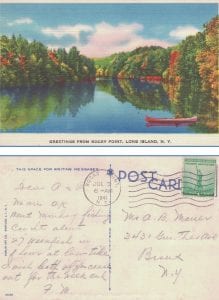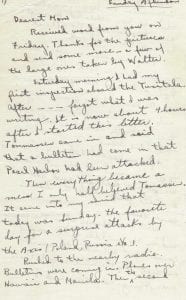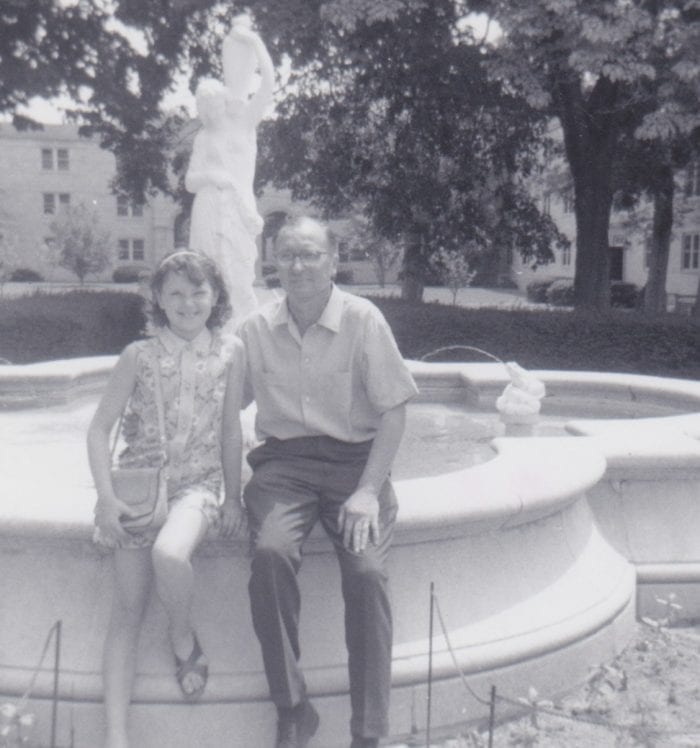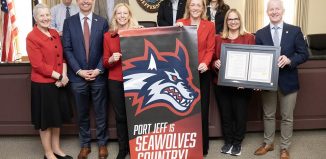Woman Documents Father’s Love of Rocky Point Through Letters and Postcards
Carol Butler, 63, a retired teacher in Ohio, knows the coarse beaches of Rocky Point. She had come there often in her childhood, visiting her grandparents with her family. Though now, after a months-long project spanning dozens of letters and postcards of her father, a sailor during World War II, she has come to understand so much more about who that man was and his connection to history.

In a self-published book Butler titled “With Love and Affection, Your Sailor, Ben,” she goes through dozens of letters and postcards her father, Bernard Mauer, sent out during his early training as a sailor for the Merchant Marines, followed by long months in the South Pacific during WWII, to create the image of her father she had not seen before: That of a young man striking out into the world looking for adventure.
Letters detail an impressionable 20-something who experienced some momentous times in the war, including the torpedoing of a boat he was on and his experience during the liberation of the Philippines. It’s the image of a man who created lasting friendships with families from Australia to Manila, who endeared himself to his comrades and also struck out more than once with the ladies. It’s a look at a man who eventually becomes homesick for the scenic landscapes of his summer home in Rocky Point.
Mauer died in 1998 at the age of 77, having already retired as a forester in 1988. Butler, already known as the family historian, said she ended up with the slew of boxes and folders. Those papers sat aside for many years when life got in the way. After she retired in 2014 and once COVID hit, she returned to her father’s old artifacts to discover so much that gave her a new perspective on a man she always knew as so kind.
“All the qualities that I had just loved about my father were on display already in this 20- to 23-year-old kid,” she said.
Mauer grew up in the Bronx. His father, Fred Mauer, a worker in a paper bag factory, had like many working and middle-class families from New York City, purchased a small bungalow in Rocky Point as a vacation home, back when a piece of vacant property in such a location went for $89. They joined a rapidly expanding community of summer residents on an island so much unlike it is today. In one of his postcards, Mauer even talked of riding his bike from his home in the Bronx the approximately 70 miles to his bungalow on the North Shore.
Mauer was a young man when he saw advertisements for the U.S. Maritime Service and decided to join up. He heard about becoming a cadet for the Merchant Marines, and later became an ensign aboard a Navy ship. He would see historical events as just another boot on the deck, witnessing firsthand the impact of torpedoes on merchant ships and Japanese kamikaze fighters on neighboring vessels. In one of his letters, the writing pauses, then returns when Mauer informs his parents of learning about the bombing of Pearl Harbor in 1941.

“It’s history reliving itself,” she said.
In his letters to his parents Marie and Fred, brother Arnie and sister-in-law Rosalyn, he would describe the white caps off the coast of St. Petersburg, Florida, to the seas of the Long Island Sound and the heat of a summer here. To him, the roads between Subic Bay and Manila in the Philippines were “like those on Rocky Point after a washout.” In his letters, he constantly references the vacation home in the small North Shore hamlet and how the life of his family revolved around it, whether it was for catching flounder or his family’s yearly trips to the North Shore hamlet.
“He could not walk across a beach without saying, such as in the Philippines, ‘Oh, this reminds me of Rocky Point,’” Butler said. “It was his point of reference in his mind … it was his lodestar.”
In his later letters from aboard ship back in ‘45 and ‘46, lacking a girlfriend, Butler said it seemed his greatest wish was to return to his family.
“He just has a sense of getting back to his family, and getting back home which dominates the last year and a half of his letters,” she said.
Butler has already done a small print run of 100 copies for her family and other history buffs interested near her. For anybody also interested in the book, she is only asking for enough to pay for the printing and shipping costs. She said people can contact her at her email:
[email protected].







